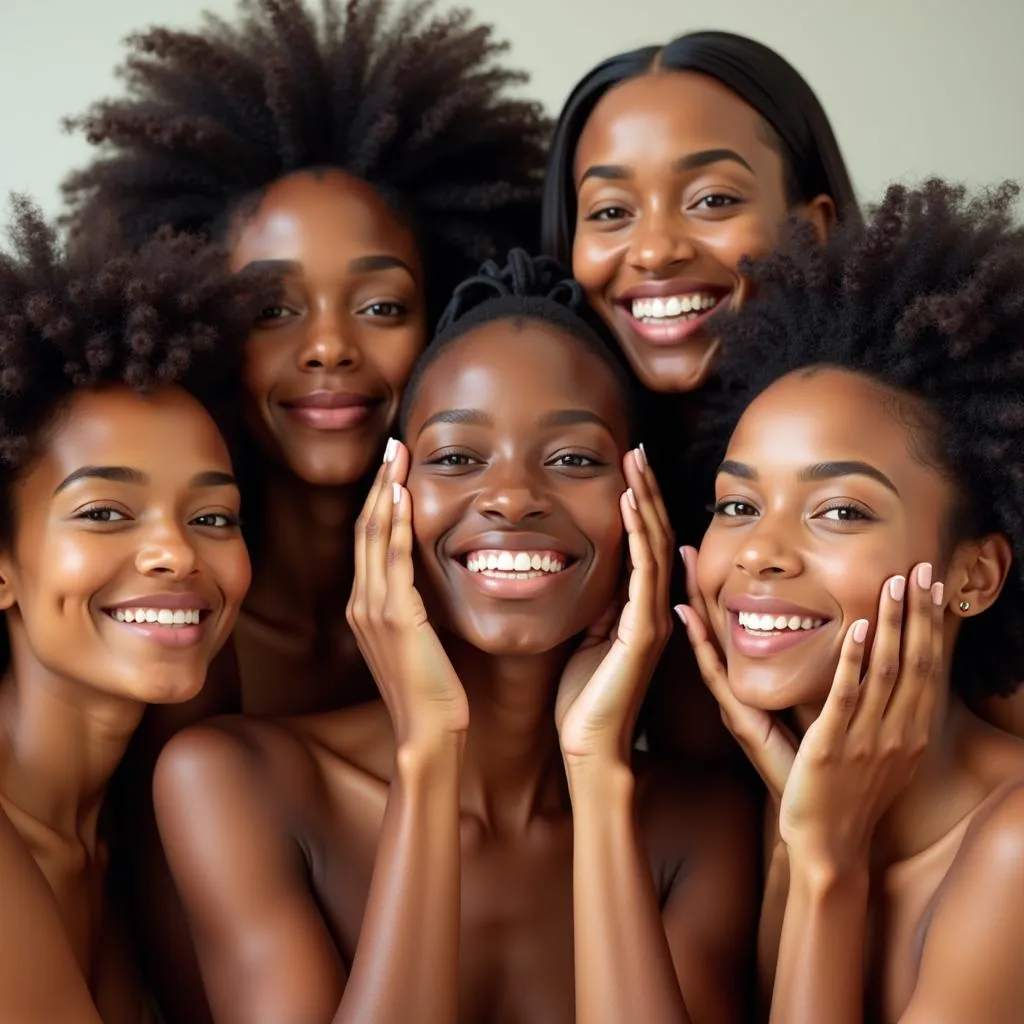Exploring the Diverse Textures of African Skin
African skin is known for its richness and variety, with a spectrum of tones, textures, and characteristics unique to the continent. Understanding the diverse textures of African skin is crucial for appreciating its beauty and complexities, as well as promoting healthy skincare practices.
This article delves into the fascinating world of African skin textures, exploring the factors that contribute to their diversity, the challenges they present, and the best practices for nurturing this remarkable skin type.
The Influence of Genetics and Geography
The diversity of African skin textures is primarily influenced by genetics and geographic location. Within the continent, various ethnic groups possess distinctive skin characteristics, often linked to their ancestral origins and environmental adaptations.
The Role of Melanin
Melanin, the pigment responsible for skin color, plays a crucial role in determining skin texture. Melanin concentration and distribution vary across African populations, influencing the appearance of skin. Higher levels of melanin generally contribute to darker skin tones and thicker skin, while lower levels result in lighter tones and finer textures.
The Impact of Climate
Climate also significantly impacts skin texture. Individuals living in hot, sunny climates tend to have thicker skin with increased melanin production to protect against harmful UV radiation. Conversely, those residing in cooler, less sunny regions may have thinner skin and lower melanin levels.
Common African Skin Textures
African skin comes in a wide range of textures, from smooth and silky to textured and coarse. Here are some common variations:
Smooth and Silky
This texture is often characterized by a soft, supple feel and a smooth, even appearance. It is common among certain ethnic groups, particularly those with lighter skin tones.
Textured and Coarse
This texture is more common among individuals with darker skin tones and is often associated with increased melanin levels. The skin may have a slightly rough, bumpy, or textured appearance.
Oily Skin
Oil production is generally higher in African skin compared to other ethnicities. This can lead to oily skin, which may be more prone to breakouts, particularly in the T-zone.
Dry Skin
While oily skin is more prevalent, African skin can also experience dryness, especially in certain climates. This can be due to a lack of moisture, harsh weather conditions, or certain skincare practices.
Caring for African Skin
Nurturing the unique characteristics of African skin requires a tailored approach.
Moisturizing is Key
Maintaining adequate hydration is crucial for all skin types, but it’s especially essential for African skin. Regular moisturizing helps to prevent dryness, flakiness, and other skin issues.
“Hydration is the foundation of healthy skin,” says Dr. Abena Mensah, a renowned dermatologist specializing in African skin. “Using a rich, hydrating moisturizer daily is crucial for maintaining moisture balance and preventing dryness.”
Gentle Exfoliation
Exfoliating removes dead skin cells, promoting cell turnover and revealing a brighter complexion. However, African skin can be sensitive, so gentle exfoliation techniques are recommended.
“Choose exfoliating products designed for sensitive skin and avoid harsh scrubs,” advises Dr. Mensah. “Gentle chemical exfoliants, such as those containing lactic acid or glycolic acid, can be effective in removing dead skin cells without irritating the skin.”
Protecting from Sun Damage
Sun protection is paramount for all skin types, but particularly for African skin, which is prone to hyperpigmentation and other sun-related damage.
“Always wear sunscreen with an SPF of 30 or higher, even on cloudy days,” emphasizes Dr. Mensah. “Wide-brimmed hats and sunglasses also offer additional protection.”
Addressing Specific Concerns
African skin may experience specific concerns like hyperpigmentation, acne, and ingrown hairs. Consult a dermatologist for personalized advice and treatment options.
 Skincare Routine for African Skin
Skincare Routine for African Skin
FAQs about African Skin Textures
What causes the differences in African skin textures?
The diversity of African skin textures is mainly attributed to genetics, geography, and climate.
What are the best practices for caring for textured African skin?
Gentle exfoliation, consistent moisturizing, and sun protection are crucial for maintaining healthy textured African skin.
Can I use the same skincare products as my non-African friends?
While some products may work for both skin types, it’s generally recommended to use products specifically formulated for African skin to address its unique needs.
What are some common skin concerns among African women?
Hyperpigmentation, acne, and ingrown hairs are common skin concerns among African women.
Where can I find more information on African skin care?
Consult a dermatologist or seek information from reputable sources that specialize in African skin care.
Conclusion
Understanding the diversity of African skin textures is essential for appreciating the beauty and complexities of this remarkable skin type. By embracing the unique characteristics of African skin and adopting tailored skincare practices, we can promote healthy, glowing skin and celebrate the diversity of beauty that exists across the continent.

